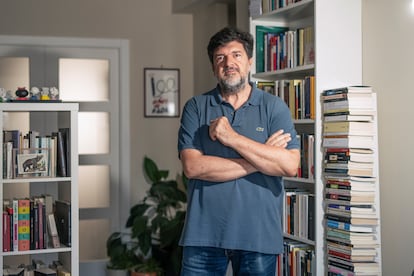Antonio Martínez Asensio (Madrid, 60 years) is an authorized voice in the literary world. Accumulates more than 300 episodes at the head of the program A book. One hour of the SER chain, which every Sunday renews great classics of universal letters. Such a disseminative work has earned him the last Liber Prize of the Editors Guild to the promotion of reading. Training philologist, was a precursor in the production of audiobooks and now publishes his first written work: One hundred books, a life (Aguilar), where he leads the reader through the titles that fueled his passion for literature. Virginia Woolf, Oscar Wilde, Gabriel García Márquez, José Saramago or Belén Gopegui are some of the authors who state in their pages. “It is a very personal selection,” he grants in the living room of his home rented in Madrid, less populated with books than one would expect. “I’m keeping you at my mother’s house, moving with them is crazy,” he says.
Ask. How attached to your library?
Answer. Less than a few years ago. The financial crisis of 2008 took me ahead and I had to sell everything. I kept 150 books of the almost 7,500 I had. Now I have bought many again, I also enjoy giving them.
P. What should be the strategy to continue adding adherents to the cause of reading?
R. Communicating passion for literature is the way I have found to do it. It makes me very excited when someone buys my book after a presentation and, in addition, it takes some of these 100 titles that for me have been so important.
P. Enjoy more reading or explaining to others what you have read?
R. If what I like most in the world is to read, the second thing I enjoy is to tell. Put a book in 22 pages, which is the extension of the script of my program.
P. Can a book change your life? Or it is a topicazo.
R. It is true in the sense that you would not be the same person if you had not read it. Some books modify something within you, others transform your gaze to the world. THE ANNIVERSARY BUYER (2008), by Adolfo García Ortega, opened the doors to the concentration field literature of Primo Levi and Jorge Semprún. It is a pass.
P. So is there an adequate book for each vital moment?
R. Definitely. Reading is completing the literary fact, modifying what is written with our point of view. Ties (2018), by Domenico Starnone, who describes how a relationship is degrading over the years to become a horror, it was so important to me because I was thinking of divorcing me when I read it.
P. In your program also draws the context of each book. Does sometimes interest the work itself?
R. I use it to separate the plots. People like to know that Flaubert invented the free indirect style, something that all writers use today. It is in Madame Bovary (1857) and is the origin of the inner monologue of (James) Joyce.
“Reading is completing the literary fact with our point of view”
P. It is said with a certain sneer that there are more authors than books. Do we attend inflation of publications?
R. It is necessary to distinguish the commercial literature from the acquisition. Large editorial groups chase influencers Thinking only about their results account, they don’t care about quality. No one will remember these books in a few years, they are one shot. Good literature will remain there.
P. Graham Swift defends that literature explains the inexplicable. What is the work of journalism?
R. The novel raises questions, wakes you up, makes you progress. Journalism has to answer those questions.
P. Will there be a time when artificial intelligence is able to produce its program?
R. I assume that artificial intelligence will be everywhere, by then I hope to be retired. You can tell you to tell you The Count of Montecristo In an hour, but it will not explain why that book was key to me. Those stories connect with others.
P. Some of this already happens in the world of audiobooks, which you know well.
R. There are already large stamps producing audiobooks with artificial intelligence. On the other hand, there will always be that other audience that wants a flesh and blood narrator. An audience willing to become a prémica and pay a little more in order to listen to the voice of an actor.
P. How do you see the panorama of the letters in Spanish?
R. Enjoy good health. There are women doing very good things, such as Lara Moreno, Irene Vallejo or Layla Martínez, although we are a single book. This year has touched The empty house peninsulaby David Uclés, which is not easy. More than one will stumble.

